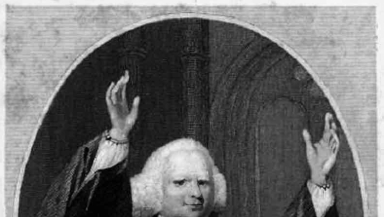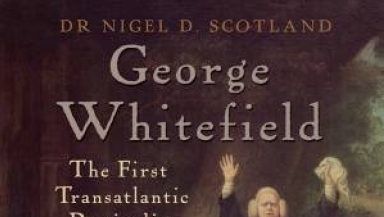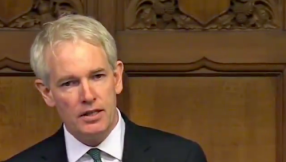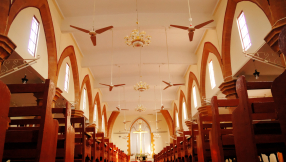"He crossed the Atlantic thirteen times, preached more than eighteen thousand sermons... gave unexampled energy. No other man ever preached to so large assemblies with an influence so powerful."
So reads the inscription on a moment to George Whitefield at Newbury Port.
Nearly 250 years after his death, this English Anglican cleric who co-founded Methodism continues to inspire Christians around the world with his zeal for preaching God's Word.
He once declared that "the world is now my parish" and in both the US and the UK, he regularly drew crowds of thousands to his open air sermons.
Dr Nigel D Scotland tells the story of this prolific preacher in his new biography, George Whitefield: The First Transatlantic Revivalist, published by Lion Hudson.
He speaks to Christian Today about the remarkable and enduring legacy of this 'Grand Itinerant'.
CT: What was it about George Whitefield that inspired you to write a new biography?
Dr Scotland: I think in George Whitefield we see someone who was really sold out for proclaiming the Christian message in word, but he is also someone who validated the words that he spoke by the works of Jesus. In other words he lived out Jesus' teaching in a very practical way that impacted both the colonies of America and the home countries of England, Scotland, Wales and Ireland. So he was a very practical Christian who really involved himself both in the world around him and through the Christian communities.

CT: Some of the stats around George Whitefield are quite staggering. He preached some 18,000 sermons. He really got around didn't he.
Dr Scotland: He did. He is known as the 'Great Itinerant' because he probably travelled more than any other preacher in both the colonies of America and indeed of course England. He visited Scotland at least nine times travelling up from the south. So you begin to get an idea of what a strenuous traveller he was.
CT: What do you think drew him to America?
Dr Scotland: We know that he had been part of the Holy Club in Oxford that the Wesleys and other preachers like Benjamin Ingham were part of. The Wesleys went out to Georgia and felt there was a need for more helpers and wrote to Whitefield urging him to come out. At the time he was just setting off, the Wesleys were returning to England and actually felt a little disillusioned so they tried to put Whitefield off, but his ship was already in Deal [Kent] ready to set sail and Whitefield felt God was calling him so he went and he was a great deal more successful.
CT: His style was open air preaching. What was it about this that particularly appealed to Whitefield?
Dr Scotland: Whitefield was the first in a long chain of revivalists who used the open air. I think the first thing was that there was no restraining hand on him. He was a Church of England priest of course but he felt that the Church of the day was very latitudinarian and broad church, and was not really open to the Gospel message.
In particular, they were not keen on felt experience which in the rational times of the 18th century was felt to be 'enthusiastic' and so he often resorted to the open air primarily because he was put out of the Church of England churches who found his preaching a bit too much 'in your face' and a bit too much to cope with.
This had a greater impact on the poor who were often made to feel second class in the Anglican churches where there were often few places for them to sit. Many Anglican churches only had benches at the back for the poor and seats were reserved for the wealthy.
For the poor who felt like second class citizens, they were very glad to gather in the open air. In the summer months, in the heat, that was just fine; it was obviously much harder in winter times. But we know that many people braved the bad climates to hear him preach.

CT: Did the Church of England see Whitefield as a troublemaker then?
Dr Scotland: Certainly the hierarchy and the bishops of London and Canterbury in particular spoke strongly against him. Remarkably, his own bishop of Gloucester was really quite sympathetic to him and ordained him two years below the canonical age. At this time, you were not supposed to be ordained before the age of 23 but for some reason Bishop Benson felt God was telling him to ordain Whitefield so as soon as he finished his degree at 21, he ordained him.
CT: How instrumental was Whitefield to the establishment of Methodism?
Dr Scotland: We can say at the very least that he was a cofounder of Methodism. Although the Wesleys brought him to faith in Christ, they hadn't really got the sense of the new birth which Whitefield actually received before they did.
I think the great thing about Whitefield is that he was the first person to really start to proclaim this Gospel where a person would not only know about Christ but would be able to experience Him subjectively in their heart by the new birth.
He was the great preacher and the first to do the open air and it's been said by many other historians that he changed what was a small pietistic movement and put it onto the world stage. It was Whitefield that made a small revival movement among churchmen into a really great revival on both sides of the Atlantic.
CT: He wasn't just a preacher, though, was he because one of the things he invested in a lot was orphanages?
Dr Scotland: Yes, he had his own orphanage. This was from a recommendation to him by Charles Wesley who was very conscious that many people were dying in the hot climates of Savannah and he felt there was a need for this.
Whitefield had a heart for this I think in part because he had a bit of a sad upbringing himself as his own father died when he was quite young.
He did make the Bethesda Home a lifelong project but it sadly didn't outlast him. By the time his ministry was coming to an end, he was trying to change it into a place of higher education.
But it did have a great effect because he managed to raise huge sums of money for it and I think it encouraged many churchmen to see the importance of raising money for the poor. Of course at that time there were no governmental organisations to support the poor apart from the Poor Laws and so I think Whitefield stirred many Christians to see that caring for the poor, the needy and the marginalised was very important and indeed an integral part of the Christian message.
CT: John Wesley preached at his funeral. Was his relationship with the Wesleys always close?
Dr Scotland: I think it was close in the early days but once the Methodist movement really got going there was a major division over the question of salvation. George Whitefield was one of those who believed that salvation was for the elect while John Wesley believed it was for all.
Although Whitefield always preached Christ to everybody, in practice he believed only the elect could take hold of it. There were other consequences that flowed from that and it was a hot potato that was strongly debated.
Towards the end of their years, they became more irenical and realised it was something they couldn't resolve and so came to accept one another's differences more. Whitefield was a very loving person and laid it down that he always wanted John Wesley to preach the sermon at his funeral if he should die first. And Wesley did speak very positively and encouragingly of him in his funeral address.
CT: A lot of research has gone into your new biography. Did you discover anything new about Whitefield that surprised you?
Dr Scotland: Whitefield wrote letters by the trunk full. We have 1,500 published letters which cover three volumes of his work and I did wade all the way through those letters and it was about a two and a half year project. One of the things I have discovered relates to his spiritual life, which fuelled his whole work and ministry.
One of the unique things about him was the nature of his devotional times. While we would just read the Bible and pray, he did that but would always sing. He would sing Watt's hymns or some of the metrical Psalms. He prayed long, loud, late and enthusiastically. He records that many times he prayed until he sweated. I don't suppose many people do that.
He was also in his spirituality very concerned to ask people to correct his faults. He wore his heart on his sleeve and if he did something wrong he publicly admitted them. He sought constantly for God's Spirit and many of his sermons contained details about the need to pray for the indwelling presence of God's Spirit.
He was very taken with the sacrament of communion and although he was very free and celebrated the Lord's supper with Batpists and Methodists, which was probably uncanonical, he had quite an Anglican view of the sacrament and whenever he could, he liked to share in the Prayer Book communion.
CT: It must be quite hard to caputre what his greatest legacy might be for the Church today. What do you think his legacy is?
Dr Scotland: I think it gave people a huge confidence in the Christian message because they could see that what he proclaimed was changing lives on a very big scale in both England and in the colonies and he impacted many aspects of culture. He was very strong against drunkenness, horseriding and the stage, and very concerned to help the poor.
He was very strong on education and supporting the teaching of children. He had a major hand in forming the University of Pennsylvania and also raised money for Princeton in addition to setting up schools in his own parish in Savannah and other parts.
And it is said that he was probably the best known person in the American colonies and the British Isles during the middle years of the 18th century. I think we could say that he had a profound effect on the American colonies.
One of the things that has interested me is that he brought together all the different denominations in the colonies - the Methodists, Baptists, the Congregationalists, the Quakers. He embraced them all and was very warm towards them, and so he straddled the denominations. This created a great unity among Christian people and they felt that if they had this unity and freedom among themselves, there was a democratic spirit which fuelled eventually the American Revolution.













